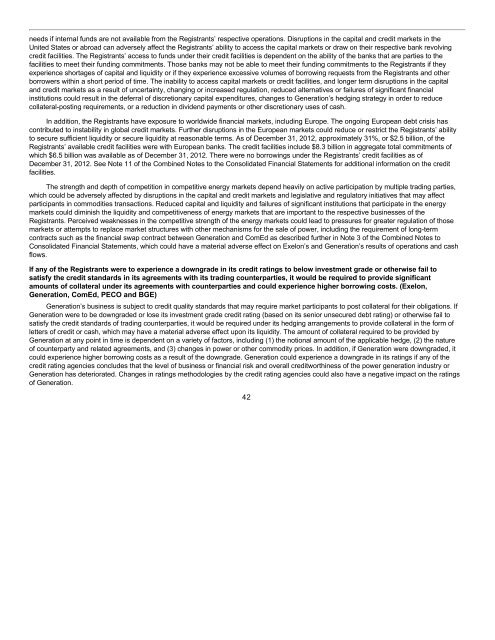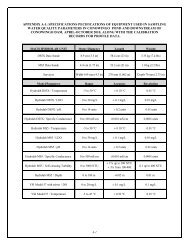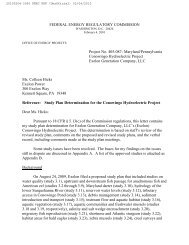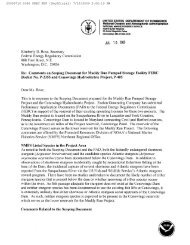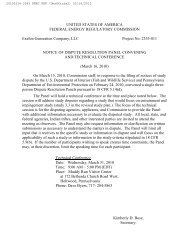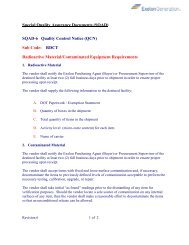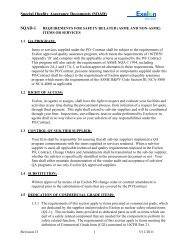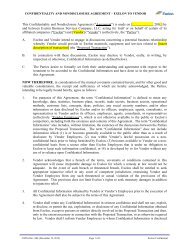- Page 1 and 2: UNITED STATES SECURITIES AND EXCHAN
- Page 3 and 4: Exelon Generation Company, LLC and
- Page 5 and 6: Page No. ITEM 7A. QUANTITATIVE AND
- Page 7 and 8: GLOSSARY OF TERMS AND ABBREVIATIONS
- Page 9 and 10: Other Terms and Abbreviations LTIP
- Page 11 and 12: FILING FORMAT This combined Annual
- Page 13 and 14: including the City of Baltimore, as
- Page 15 and 16: following the merger completion. In
- Page 17 and 18: egulations by the NRC may require a
- Page 19 and 20: of new merchant nuclear power plant
- Page 21 and 22: y third parties. In 2012 and 2011,
- Page 23 and 24: the type of underlying asset. Gener
- Page 25 and 26: ComEd ComEd is engaged principally
- Page 27 and 28: due to weather events or conditions
- Page 29 and 30: Smart Meter, Smart Grid and Energy
- Page 31 and 32: BGE’s highest peak load occurred
- Page 33 and 34: • a liquefied natural gas facilit
- Page 35 and 36: Environmental Regulation General Ex
- Page 37 and 38: attributable to low level radioacti
- Page 39 and 40: hydro and pumped storage, and suppl
- Page 41 and 42: Name Age Position Period Pramaggior
- Page 43 and 44: Name Age Position Period O’Neill,
- Page 45 and 46: ITEM 1A. RISK FACTORS Each of the R
- Page 47: under their obligations for operati
- Page 51 and 52: 1999 sale of fossil generating asse
- Page 53 and 54: lived assets for potential impairme
- Page 55 and 56: were weather and the economy. With
- Page 57 and 58: Generation’s affiliation with Com
- Page 59 and 60: Federal and state legislation manda
- Page 61 and 62: Generation may be negatively affect
- Page 63 and 64: the Registrants face a risk that th
- Page 65 and 66: of funds necessary for decommission
- Page 67 and 68: with most companies in today’s en
- Page 69 and 70: ITEM 2. PROPERTIES Generation The f
- Page 71 and 72: Primary Net Station Region Location
- Page 73 and 74: Transmission and Distribution PECO
- Page 75 and 76: (Dollars in millions except per sha
- Page 77 and 78: PECO As of January 31, 2013, there
- Page 79 and 80: ITEM 6. SELECTED FINANCIAL DATA Exe
- Page 81 and 82: December 31, (In millions) 2012 201
- Page 83 and 84: Item 7. MANAGEMENT’S DISCUSSION A
- Page 85 and 86: purchased power and fuel expense in
- Page 87 and 88: units and compensation for operatin
- Page 89 and 90: (2) the rate of expansion of subsid
- Page 91 and 92: Hedging Strategy Exelon’s policy
- Page 93 and 94: number of factors, including RTO re
- Page 95 and 96: On December 16, 2011, the U.S. EPA
- Page 97 and 98: In April 2011, the NRC named six se
- Page 99 and 100:
FERC Ameren Order. In July 2012, FE
- Page 101 and 102:
decommissioning. Probabilities assi
- Page 103 and 104:
guidance, which became effective Ja
- Page 105 and 106:
Impairment may occur when the carry
- Page 107 and 108:
changes or experience different fro
- Page 109 and 110:
Sensitivity to Changes in Key Assum
- Page 111 and 112:
The Registrants account for derivat
- Page 113 and 114:
Interest Rate Derivative Instrument
- Page 115 and 116:
upon actual costs incurred and inve
- Page 117 and 118:
Net Income Year Ended December 31,
- Page 119 and 120:
Generation’s supply sources by re
- Page 121 and 122:
decreased realized margins in 2011
- Page 123 and 124:
Year Ended December 31, 2011 Compar
- Page 125 and 126:
ecorded in 2012, a $36 million barg
- Page 127 and 128:
Electric revenues and purchased pow
- Page 129 and 130:
Volume—delivery Revenues net of p
- Page 131 and 132:
Operating and Maintenance Expense Y
- Page 133 and 134:
Other, Net The changes in other, ne
- Page 135 and 136:
Operating Revenues Net of Purchased
- Page 137 and 138:
The changes in PECO’s operating r
- Page 139 and 140:
The changes in operating and mainte
- Page 141 and 142:
year ended December 31, 2011 includ
- Page 143 and 144:
Results of Operations—BGE 2012 20
- Page 145 and 146:
Volume. Heating and cooling degree
- Page 147 and 148:
Other Other revenues increased duri
- Page 149 and 150:
BGE Electric Operating Statistics a
- Page 151 and 152:
The Registrants primarily use their
- Page 153 and 154:
Cash flows provided by operations f
- Page 155 and 156:
(e) The projected capital expenditu
- Page 157 and 158:
Company Issuances of long-term debt
- Page 159 and 160:
From time to time and as market con
- Page 161 and 162:
Other Credit Matters Capital Struct
- Page 163 and 164:
Contractual Obligations The followi
- Page 165 and 166:
ComEd Total 2013 Payment due within
- Page 167 and 168:
• variable interest entities, see
- Page 169 and 170:
ComEd The financial swap contract b
- Page 171 and 172:
Generation ComEd PECO Intercompany
- Page 173 and 174:
Credit Risk, Collateral, and Contin
- Page 175 and 176:
PECO’s supplier master agreements
- Page 177 and 178:
PECO As of December 31, 2012, PECO
- Page 179 and 180:
ITEM 7. MANAGEMENT’S DISCUSSION A
- Page 181 and 182:
ITEM 7. MANAGEMENT’S DISCUSSION A
- Page 183 and 184:
ITEM 7. MANAGEMENT’S DISCUSSION A
- Page 185 and 186:
ITEM 7. MANAGEMENT’S DISCUSSION A
- Page 187 and 188:
ITEM 8. FINANCIAL STATEMENTS AND SU
- Page 189 and 190:
Management’s Report on Internal C
- Page 191 and 192:
Management’s Report on Internal C
- Page 193 and 194:
Report of Independent Registered Pu
- Page 195 and 196:
Report of Independent Registered Pu
- Page 197 and 198:
Exelon Corporation and Subsidiary C
- Page 199 and 200:
Exelon Corporation and Subsidiary C
- Page 201 and 202:
Exelon Corporation and Subsidiary C
- Page 203 and 204:
Exelon Generation Company, LLC and
- Page 205 and 206:
Exelon Generation Company, LLC and
- Page 207 and 208:
Commonwealth Edison Company and Sub
- Page 209 and 210:
Commonwealth Edison Company and Sub
- Page 211 and 212:
(In millions) Commonwealth Edison C
- Page 213 and 214:
PECO Energy Company and Subsidiary
- Page 215 and 216:
PECO Energy Company and Subsidiary
- Page 217 and 218:
BALTIMORE GAS AND ELECTRIC COMPANY
- Page 219 and 220:
BALTIMORE GAS AND ELECTRIC COMPANY
- Page 221 and 222:
(In millions) BALTIMORE GAS AND ELE
- Page 223 and 224:
Combined Notes to Consolidated Fina
- Page 225 and 226:
Combined Notes to Consolidated Fina
- Page 227 and 228:
Combined Notes to Consolidated Fina
- Page 229 and 230:
Combined Notes to Consolidated Fina
- Page 231 and 232:
Combined Notes to Consolidated Fina
- Page 233 and 234:
Combined Notes to Consolidated Fina
- Page 235 and 236:
Combined Notes to Consolidated Fina
- Page 237 and 238:
Combined Notes to Consolidated Fina
- Page 239 and 240:
Combined Notes to Consolidated Fina
- Page 241 and 242:
Combined Notes to Consolidated Fina
- Page 243 and 244:
Formula Rate Tariff Combined Notes
- Page 245 and 246:
Combined Notes to Consolidated Fina
- Page 247 and 248:
Combined Notes to Consolidated Fina
- Page 249 and 250:
Combined Notes to Consolidated Fina
- Page 251 and 252:
Combined Notes to Consolidated Fina
- Page 253 and 254:
Combined Notes to Consolidated Fina
- Page 255 and 256:
Combined Notes to Consolidated Fina
- Page 257 and 258:
Combined Notes to Consolidated Fina
- Page 259 and 260:
Combined Notes to Consolidated Fina
- Page 261 and 262:
Combined Notes to Consolidated Fina
- Page 263 and 264:
Combined Notes to Consolidated Fina
- Page 265 and 266:
Combined Notes to Consolidated Fina
- Page 267 and 268:
4. Merger and Acquisitions Combined
- Page 269 and 270:
Combined Notes to Consolidated Fina
- Page 271 and 272:
Combined Notes to Consolidated Fina
- Page 273 and 274:
Combined Notes to Consolidated Fina
- Page 275 and 276:
Combined Notes to Consolidated Fina
- Page 277 and 278:
Combined Notes to Consolidated Fina
- Page 279 and 280:
Combined Notes to Consolidated Fina
- Page 281 and 282:
Combined Notes to Consolidated Fina
- Page 283 and 284:
Combined Notes to Consolidated Fina
- Page 285 and 286:
Combined Notes to Consolidated Fina
- Page 287 and 288:
Combined Notes to Consolidated Fina
- Page 289 and 290:
Combined Notes to Consolidated Fina
- Page 291 and 292:
Combined Notes to Consolidated Fina
- Page 293 and 294:
Combined Notes to Consolidated Fina
- Page 295 and 296:
For the Year Ended December 31, 201
- Page 297 and 298:
Combined Notes to Consolidated Fina
- Page 299 and 300:
Combined Notes to Consolidated Fina
- Page 301 and 302:
For the Year Ended December 31, 201
- Page 303 and 304:
Combined Notes to Consolidated Fina
- Page 305 and 306:
BGE Combined Notes to Consolidated
- Page 307 and 308:
Combined Notes to Consolidated Fina
- Page 309 and 310:
Combined Notes to Consolidated Fina
- Page 311 and 312:
Combined Notes to Consolidated Fina
- Page 313 and 314:
Combined Notes to Consolidated Fina
- Page 315 and 316:
Combined Notes to Consolidated Fina
- Page 317 and 318:
Combined Notes to Consolidated Fina
- Page 319 and 320:
Combined Notes to Consolidated Fina
- Page 321 and 322:
Year Ended December 31, 2011 (As Re
- Page 323 and 324:
Combined Notes to Consolidated Fina
- Page 325 and 326:
Combined Notes to Consolidated Fina
- Page 327 and 328:
Combined Notes to Consolidated Fina
- Page 329 and 330:
Combined Notes to Consolidated Fina
- Page 331 and 332:
Combined Notes to Consolidated Fina
- Page 333 and 334:
Generation Combined Notes to Consol
- Page 335 and 336:
Combined Notes to Consolidated Fina
- Page 337 and 338:
Combined Notes to Consolidated Fina
- Page 339 and 340:
Combined Notes to Consolidated Fina
- Page 341 and 342:
Combined Notes to Consolidated Fina
- Page 343 and 344:
Other Tax Matters Combined Notes to
- Page 345 and 346:
Combined Notes to Consolidated Fina
- Page 347 and 348:
Combined Notes to Consolidated Fina
- Page 349 and 350:
Combined Notes to Consolidated Fina
- Page 351 and 352:
Combined Notes to Consolidated Fina
- Page 353 and 354:
Combined Notes to Consolidated Fina
- Page 355 and 356:
Combined Notes to Consolidated Fina
- Page 357 and 358:
Combined Notes to Consolidated Fina
- Page 359 and 360:
Components of AOCI and Regulatory A
- Page 361 and 362:
Combined Notes to Consolidated Fina
- Page 363 and 364:
Contributions Combined Notes to Con
- Page 365 and 366:
Combined Notes to Consolidated Fina
- Page 367 and 368:
Combined Notes to Consolidated Fina
- Page 369 and 370:
Combined Notes to Consolidated Fina
- Page 371 and 372:
Combined Notes to Consolidated Fina
- Page 373 and 374:
Eddystone Station and Cromby Statio
- Page 375 and 376:
Combined Notes to Consolidated Fina
- Page 377 and 378:
Combined Notes to Consolidated Fina
- Page 379 and 380:
Combined Notes to Consolidated Fina
- Page 381 and 382:
Combined Notes to Consolidated Fina
- Page 383 and 384:
Combined Notes to Consolidated Fina
- Page 385 and 386:
Combined Notes to Consolidated Fina
- Page 387 and 388:
Combined Notes to Consolidated Fina
- Page 389 and 390:
Other Purchase Obligations Combined
- Page 391 and 392:
Combined Notes to Consolidated Fina
- Page 393 and 394:
Combined Notes to Consolidated Fina
- Page 395 and 396:
Combined Notes to Consolidated Fina
- Page 397 and 398:
Combined Notes to Consolidated Fina
- Page 399 and 400:
Combined Notes to Consolidated Fina
- Page 401 and 402:
Solid and Hazardous Waste Combined
- Page 403 and 404:
Combined Notes to Consolidated Fina
- Page 405 and 406:
Combined Notes to Consolidated Fina
- Page 407 and 408:
Combined Notes to Consolidated Fina
- Page 409 and 410:
Combined Notes to Consolidated Fina
- Page 411 and 412:
Combined Notes to Consolidated Fina
- Page 413 and 414:
Combined Notes to Consolidated Fina
- Page 415 and 416:
Combined Notes to Consolidated Fina
- Page 417 and 418:
Accumulated Other Comprehensive Inc
- Page 419 and 420:
Combined Notes to Consolidated Fina
- Page 421 and 422:
Combined Notes to Consolidated Fina
- Page 423 and 424:
Combined Notes to Consolidated Fina
- Page 425 and 426:
Combined Notes to Consolidated Fina
- Page 427 and 428:
Combined Notes to Consolidated Fina
- Page 429 and 430:
Combined Notes to Consolidated Fina
- Page 431 and 432:
Combined Notes to Consolidated Fina
- Page 433 and 434:
ITEM 9. CHANGES IN AND DISAGREEMENT
- Page 435 and 436:
PART III Exelon Generation Company,
- Page 437 and 438:
ITEM 12. SECURITY OWNERSHIP OF CERT
- Page 439 and 440:
ITEM 14. PRINCIPAL ACCOUNTING FEES
- Page 441 and 442:
Exelon Corporation and Subsidiary C
- Page 443 and 444:
Exelon Corporation and Subsidiary C
- Page 445 and 446:
1. Basis of Presentation Exelon Cor
- Page 447 and 448:
5. Related Party Transactions Exelo
- Page 449 and 450:
Exelon Corporation and Subsidiary C
- Page 451 and 452:
Exelon Generation Company, LLC and
- Page 453 and 454:
Commonwealth Edison Company and Sub
- Page 455 and 456:
PECO Energy Company and Subsidiary
- Page 457 and 458:
Baltimore Gas and Electric Company
- Page 459 and 460:
Exhibit No. Description 2-13 Contri
- Page 461 and 462:
Exhibit No. Description 4-2 Exelon
- Page 463 and 464:
Exhibit No. Description 4-5 4-6 Ind
- Page 465 and 466:
Exhibit No. Description 4-31 Series
- Page 467 and 468:
Exhibit No. Description 10-31 Amend
- Page 469 and 470:
Exhibit No. Description 10-57 Admin
- Page 471 and 472:
Exhibit No. Description 24-29 Chari
- Page 473 and 474:
SIGNATURES Pursuant to the requirem
- Page 475 and 476:
SIGNATURES Pursuant to the requirem
- Page 477 and 478:
SIGNATURES Pursuant to the requirem
- Page 479 and 480:
Exelon Generation Company, LLC Rati
- Page 481 and 482:
PECO Energy Company Ratio of Earnin
- Page 483 and 484:
Exelon Corporation Subsidiary Listi
- Page 485 and 486:
CLT Energy Services Group, L.L.C. P
- Page 487 and 488:
Exelon AOG Holding #1, Inc. Delawar
- Page 489 and 490:
Michigan Wind 1, LLC Delaware Michi
- Page 491 and 492:
Exelon Generation Company, LLC Subs
- Page 493 and 494:
Cogenex Corporation MA CoLa Resourc
- Page 495 and 496:
Exelon New Boston, LLC DE Exelon Ne
- Page 497 and 498:
Residential Solar Holding, LLC DE R
- Page 499 and 500:
PECO Energy Company Subsidiary List
- Page 501 and 502:
CONSENT OF INDEPENDENT REGISTERED P
- Page 503 and 504:
CONSENT OF INDEPENDENT REGISTERED P
- Page 505 and 506:
CONSENT OF INDEPENDENT REGISTERED P
- Page 507 and 508:
POWER OF ATTORNEY Exhibit 24.2 KNOW
- Page 509 and 510:
POWER OF ATTORNEY Exhibit 24.4 KNOW
- Page 511 and 512:
POWER OF ATTORNEY Exhibit 24.6 KNOW
- Page 513 and 514:
POWER OF ATTORNEY Exhibit 24.8 KNOW
- Page 515 and 516:
POWER OF ATTORNEY Exhibit 24.10 KNO
- Page 517 and 518:
POWER OF ATTORNEY Exhibit 24.12 KNO
- Page 519 and 520:
POWER OF ATTORNEY Exhibit 24.14 KNO
- Page 521 and 522:
POWER OF ATTORNEY Exhibit 24.16 KNO
- Page 523 and 524:
POWER OF ATTORNEY Exhibit 24.18 KNO
- Page 525 and 526:
POWER OF ATTORNEY Exhibit 24.20 KNO
- Page 527 and 528:
POWER OF ATTORNEY Exhibit 24.22 KNO
- Page 529 and 530:
POWER OF ATTORNEY Exhibit 24.24 KNO
- Page 531 and 532:
POWER OF ATTORNEY Exhibit 24.26 KNO
- Page 533 and 534:
POWER OF ATTORNEY Exhibit 24.28 KNO
- Page 535 and 536:
POWER OF ATTORNEY Exhibit 24.30 KNO
- Page 537 and 538:
POWER OF ATTORNEY Exhibit 24.32 KNO
- Page 539 and 540:
POWER OF ATTORNEY Exhibit 24.34 KNO
- Page 541 and 542:
POWER OF ATTORNEY Exhibit 24.36 KNO
- Page 543 and 544:
I, Christopher M. Crane, certify th
- Page 545 and 546:
I, Christopher M. Crane, certify th
- Page 547 and 548:
I, Anne R. Pramaggiore, certify tha
- Page 549 and 550:
I, Craig L. Adams, certify that: CE
- Page 551 and 552:
I, Kenneth W. DeFontes Jr., certify
- Page 553 and 554:
Certificate Pursuant to Section 135
- Page 555 and 556:
Certificate Pursuant to Section 135
- Page 557 and 558:
Certificate Pursuant to Section 135
- Page 559 and 560:
Certificate Pursuant to Section 135
- Page 561 and 562:
Certificate Pursuant to Section 135


